Best Dart Programming Guides to Buy in February 2026
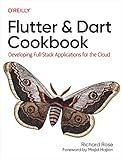
Flutter and Dart Cookbook: Developing Full-Stack Applications for the Cloud



Flutter Design Patterns and Best Practices: Build scalable, maintainable, and production-ready apps using effective architectural principles



Flutter For Dummies


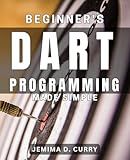
Beginner's Dart Programming Made Simple: #ERROR!



Dart Programming, In 8 Hours, For Beginners, Learn Coding Fast: Dart Programming Language, Crash Course Tutorial, Quick Start Guide & Exercises


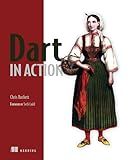
Dart in Action


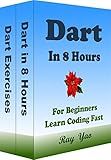
Dart Programming, In 8 Hours, For Beginners, Learn Coding Fast: Dart Language Crash Course Textbook & Exercises (Cookbooks in 8 Hours 3)



Dart for Beginners: A Complete Guide to Learning Dart Programming from Scratch



Flutter Cookbook: 100+ step-by-step recipes for building cross-platform, professional-grade apps with Flutter 3.10.x and Dart 3.x, 2nd Edition


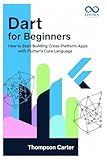
Dart for Beginners: How to Start Building Cross-Platform Apps with Flutter’s Core Language


In Dart, you can pass a list as a parameter to a function or method. This allows you to perform operations on the elements of the list within the function. To pass a list as a parameter in Dart, you need to follow these steps:
- Declare the function or method that accepts the list as a parameter. For example:
void processList(List numbers) { // Function body }
Here, the function processList takes a list of integers (List<int> numbers) as a parameter.
- In the function body, you can access the elements of the list using the parameter name (numbers). You can iterate over the list, perform operations on its elements, or use them as required.
- When calling the function and passing a list, make sure to pass a list that matches the specified type. For instance:
void main() { List myNumbers = [1, 2, 3, 4, 5]; processList(myNumbers); }
In the above example, we create a list of integers called myNumbers, and then we pass it as an argument to the processList function.
By following these steps, you can pass a list as a parameter in Dart, allowing you to work with the list's elements within a function or method.
How do you pass a list of lists as a parameter in Dart?
In Dart, you can pass a list of lists as a parameter by specifying the data type annotation as List<List<T>>, where T can be any data type. Here's an example:
void processListOfLists(List<List> matrix) { // Process the list of lists for (var row in matrix) { for (var element in row) { // Perform some operations on the element print(element); } } }
void main() { List<List> matrix = [ [1, 2, 3], [4, 5, 6], [7, 8, 9], ];
processListOfLists(matrix); }
In the above code, the processListOfLists function takes a parameter matrix of type List<List<int>>, where inner lists contain integers. The main function creates a 2D list matrix and passes it to the processListOfLists function for further processing.
Note that you can replace int with any other data type based on the content of your lists.
Can you pass a list with duplicate elements as a parameter in Dart?
Yes, it is possible to pass a list with duplicate elements as a parameter in Dart. Dart does not have any restrictions on passing a list with duplicate elements as a parameter to a function or method. The list can be of any type, including strings, integers, or custom objects.
How do you pass a list of objects as a parameter in Dart?
To pass a list of objects as a parameter in Dart, you can follow these steps:
- Define your class or object type.
- Declare a list variable of the class type.
- Define a function that takes a list of objects as a parameter.
- Pass the list of objects to the function.
Here's an example:
class Person { String name; int age;
Person(this.name, this.age); }
void printPersons(List persons) { for (var person in persons) { print('Name: ${person.name}, Age: ${person.age}'); } }
void main() { List persons = [ Person('Alice', 25), Person('Bob', 30), Person('Charlie', 35), ];
printPersons(persons); }
In the above example, we define a Person class with name and age properties. Then, we declare a list variable persons of type List<Person>. We create a function printPersons that takes a list of Person objects as a parameter and prints their names and ages.
Inside the main function, we initialize the persons list with three Person objects. Finally, we pass the persons list to the printPersons function to print the details of each person.
Can you pass a list parameter by reference in Dart?
No, you cannot pass a list parameter by reference in Dart. Dart uses pass-by-value for both primitive types and reference types. This means when you pass a list as a parameter to a function, a copy of the reference to the list is passed, not the actual list object. Any changes made to the reference itself within the function will not be reflected outside of the function, but changes made to the contents of the list will be visible outside of the function.
How do you handle errors when passing an invalid parameter in Dart?
In Dart, errors when passing an invalid parameter can be handled in several ways depending on the situation and the desired approach:
- Exception handling: Dart provides built-in exceptions that can be thrown and caught using the try-catch mechanism. You can catch specific exceptions or a generic Exception and handle the error accordingly. Example:
try { // Code that may throw an exception } on ArgumentError catch (e) { // Handle ArgumentError specifically print("Invalid parameter: ${e.message}"); } catch (e) { // Handle other exceptions print("An error occurred: $e"); }
- Validating input before usage: Another approach is to validate the input before performing any operations on it. You can use conditionals (if-else statements) to check if the parameter meets the required criteria. If it doesn't, you can respond with an appropriate error message or take necessary actions to handle the situation. Example:
void myFunction(int parameter) { if (parameter < 0) { throw ArgumentError('Parameter must be a positive number'); } // Rest of the code }
- Using assert statements: Dart has an assert statement that allows you to validate certain conditions during development. It throws an exception if the condition is false. This approach is particularly useful when debugging and validating assumptions about code behavior. Example:
void myFunction(int parameter) { assert(parameter >= 0, 'Parameter must be a positive number'); // Rest of the code }
Note: In some cases, Dart provides typed parameters, which can catch type-related errors at compile-time, reducing the need for runtime validation.
It's important to choose an appropriate error handling strategy based on your specific application requirements and the type of error being encountered.
